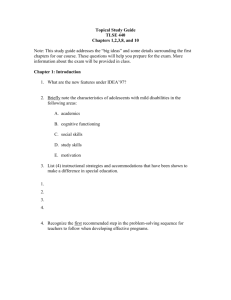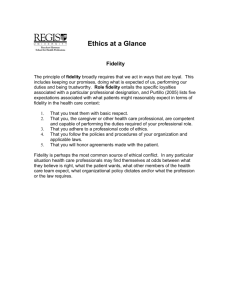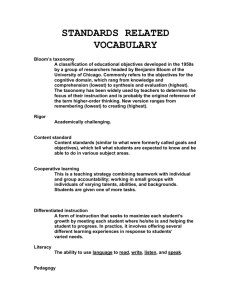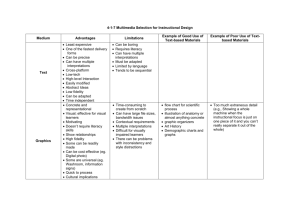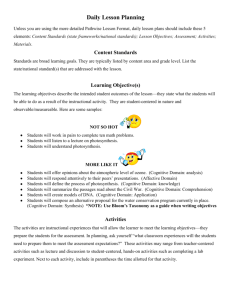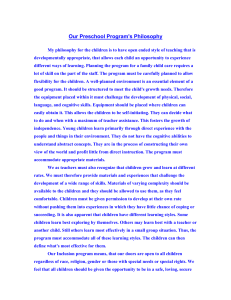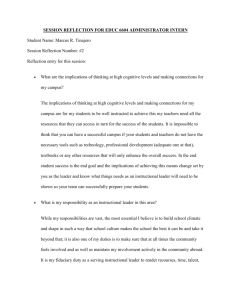Research on serious gaming - Centre for Education and Learning
advertisement
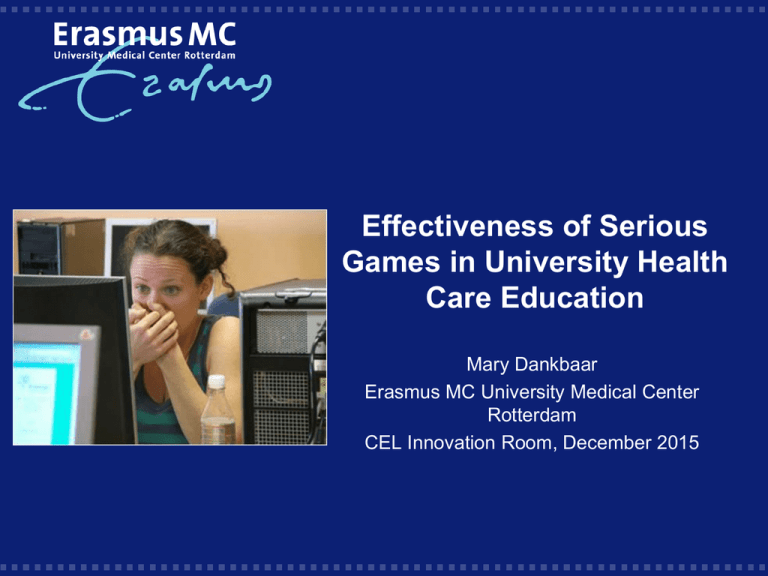
Effectiveness of Serious Games in University Health Care Education Mary Dankbaar Erasmus MC University Medical Center Rotterdam CEL Innovation Room, December 2015 Overview Why serious games in University Education? What the research says on the effectiveness of games Results PhD study: effects of games on performance and motivation Conclusions and future directions for game design and research Why Serious Games? Underground Laparoscopic skills Air Medic Sky 1 Patient safety ABCDEsim Acute care skills GeriatrX Clinical care for elderly patients Involvement in a story-line with rules and principles Experiential learning with challenging tasks (learning goals) Immediate feedback (responsive characters, score,..) Immersion and repeated play Active learning Scalability Statement 1- serious games Serious games are superior learning format in terms of improvement of knowledge and skills A. TRUE B. NOT TRUE Statement 1 - feedback Serious games are superior learning format in terms of improvement of knowledge and skills NOT TRUE o For knowledge acquisition there is in general very little added value in serious games. Other formats serve this purpose just as well, at lower costs. o Games may support skills learning, provided certain conditions for instructional design are met. o The effectiveness of an online program is mainly dependant on the didactic choices. Dankbaar MEW, Comparative effectiveness of a serious game and e-module on patient safety knowledge and awareness, 2015 Mayer RE, The Cambridge Handbook of Multimedia Learning. New York 2005 Statement 2- Adapted Online Learning Computer-driven adapted instruction, based on students’ learning styles improves the efficiency of learning - TRUE - NOT TRUE Statement 2- feedback Computer-driven adapted instruction, based on students’ learning styles improves the efficiency of learning NOT TRUE o There is no solid evidence learning styles exist o Methods for assessing learning styles lack validity evidence o No proof that adapting computer-driven instruction to these ‘styles’ works o Positive effect of strong instructional methods for learning dominates Cook DA, Revisiting cognitive and learning styles in computer-assisted instruction: not so useful after all, Ac. Medicine,vol.87,‘12. Kirschner P, van Merrienboer J, Do learners really know best? Urban legends in Education, Educ. Psychologist, vol. 48(3), ‘13. Research on effectiveness of serious games Effectiveness of serious games was not supported in systematic review studies. Although some research indicates a positive effect; in general studies show mixed and ambiguous results. (Vogel et al 2006, Tennyson & Jorzack 2008, Akl et al 2010, Sitzmann 2011, Connollly et al 2012, Graafland et al 2012). Games that train the same (psychomotor) skills that are needed in laparoscopic procedures, have shown to have a positive effect on laparoscopic procedures. (Schlickum, 2009). Technology-enhanced simulation programs in health education are associated with large effects for knowledge and skills in comparison with no intervention. (Issenberg et al, 2004, Mc.Gaghie, Issenberg et al 2010) . More research is needed to assess the effectiveness and critical design features of serious games on performance and motivation. PhD study on the effects of serious games on performance and motivation abcdeSIM game to train acute care skills for young doctors, as a preparation for face-to-face training Research questions: 1.a Are young doctors, who use the game before a f2f training, better in clinical emergency care skills than residents who did not use the game? 1.b Are they motivated to play the game? 2. Are cognitive skills and motivation of medical students more improved by adding a simulation game or text-based cases to an instructional e-module? Effects of a serious game on complex skills Self studytime 2-week certified training on acute care a b c d e a b c d e 10 hr 12.5 hr Reading group Reading & game group Skills Assessment Clinical skills before and after training 7 N=42 7 N=159 P= 0.03, ES = 0.62 P= 0.34 6 6 5 5 5.7 5.6 4.25 4 4 3.46 3 3 2 2 1 1 Reading group Before training Reading & game group Reading group Reading & game group After 2 weeks training Motivation of the reading & game groep I regularly felt stressed during playing the scenarios 3.3 During gameplay, I felt to be the doctor in charge in the ED I could find out for myself what did and did not work well N=90 3.6 3.6 “This is a very good way to develop experience with the ABCDE approach”. I found the way of learning enjoyable I was able to concentrate well during play 3.9 4.0 I found the content of the game instructive 4.1 I liked playing the game 4.2 “This feels very ‘real’; it’s a great preparation. I can feel the stress”. I felt actively involved with the patient scenarios 4.2 my attention was completely at the game scenarios 4.2 1 Completely disagree 2 3 4 Completely agree 5 PhD study on the effects of serious games on performance and motivation Research questions: 1.a Are young doctors, who use the game before a f2f training better in cognitive emergency care skills than residents who did not use the game? 1.b Are they motivated to play the game? 2. Are cognitive skills and motivation of medical students more improved by adding (high-fidelity) simulation-based cases or (low-fidelity) text-based cases to an instructional e-module? Simulation game (high fidelity cases) High level of functional and physical fidelity Text-based cases (low fidelity) Ee-module-m Low level of functional and physical fidelity, on the same cases Research design Instructional e-module Cases Questionnaires Control group, Controle n=16 groep Textcases group, n=20 Low fidelity Game Game group, groep n=25 High fidelity Knowledge test Skills assessment Questionnaires Cognitive Load (10 items, scale 0-11) Intrinsic load ‘the content of the game/cases was very complex’ (3 items) Extraneus load ‘the explanations were very unclear’ (3 items) Germane load ‘the game/cases really enhanced my understanding’ (4 items) Motivation (9 items, scale 1-5) Engagement ‘it was fun to work through the material’ (6 items) Feedback ‘during learning, I could tell whether I was doing well’ (3 items) Results (n= 61) No differences between groups in age, clinical experience, GPA bachelor Self-reported learning time in minutes, mean (SD) Logged game time E-module Game or Cases Total Control group 133 (78) - 133 Game group 146 (98) 95 (53) 241 Cases group 177 (118) 70 (46) 247 83 (54) No differences in knowledge scores between groups (M= 20, SD=3.7) Clinical skills 7 6 N=61 P = 0.13 5.4 5.2 5.6 game group cases group control group 5 4 3 2 1 Cognitive load for game-based and text-based cases 10.0 9.0 N=54 P=0.03 ES=0.8 8.4 P=0.01 ES=1.0 8.0 7.2 7.0 6.0 6.0 P=0.75 5.0 5.0 Game groep Cases groep 4.0 3.3 3.4 3.0 2.0 1.0 0.0 Intrinsic Load Extraneous Load Germane Load Motivation 5 P < 0.001*, ES =1.4 4.5 N=59 P < 0.05**, ES =1.0 4.3 4 3.5 3.5 3.6 3.4 3.1 Game group 3 2.7 Cases group Control group 2.5 2 * Game vs cases+ control ** Game vs. control 1.5 1 Engagement Feedback Conclusions For initial skills acquisition, an e-module with a video demonstration is a powerful instructional format. Novice students do not profit from working on additional open cases, which appeared to be too complex, but nonetheless challenged them to study longer. High fidelity game-based cases enhance motivation and cognitive effort, but also increases complexity and may impede learning for novices. The same game improved clinical skills among residents in an engaging way, with limited self-study time. ‘Expertise-reversal effect’: a rich learning environment may benefit experts, but is counter-productive for novice learners (interaction prior knowledge - complexity of formats) Conclusions- game design Case complexity and fidelity in serious games should be well aligned with students’ proficiency level. Case complexity may be reduced by offering guidance (worked cases, hints). Exercising with cases with a range of task difficulty and clinical variation have proven to be effective for skills training with simulation programs. Issenberg et al, Features and uses of high-fidelity medical simulations that lead to effective learning: BEME syst, review, 2005 Cook et al, Comparative effectiveness in instructional design features in simulation-based education: a systematic review , 2013 Future directions for game research Design based research is needed on: The relation between case-complexity, case-fidelity, motivation and skills development. How to facilitate optimal and engaged learning? (‘flow’) Which design-features improve a game’s effectiveness for performance improvement? (forms of feedback, debriefing) How should multi-player games to develop communication skills be designed? (critical design features) Thank you for your attention! Questions? Contact information m.dankbaar@erasmusmc.nl Mary Dankbaar Erasmus MC University Medical Center Rotterdam
